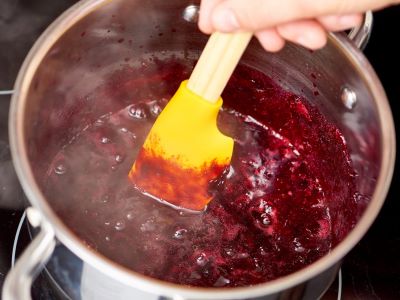Jam is one of everyone’s favourite ingredients in morning breakfast. As it is made of fruits, it is generally assumed to be healthy. We humans normally enjoy eating jam. As the main ingredient in jam is supposed to be fruit, many of you may presume it to be good for your canine companion too.

There is no doubt that fruits are great treats for your dogs and have health benefits too. But fruit in the form of jam is still a doubtful question. Before thinking about feeding your dog jam, you must consider all the risks associated with it.
In this article we will try to provide you with all the necessary information regarding jam and whether should it be fed to your dog or not.
Why Is Jam Bad for Dogs
Jam is not good for dogs. It may taste tasty but is harmful to dogs as it is full of sugar and ingredients toxic to dogs. A dog’s body requires sugar and many people presume that giving a spoonful of jam may be good. But it’s a big no.
A dog’s body requires natural sugar, not the one made in factories. Jam consists of factory-made sugar and thus is harmful to them. Feeding your dog excessive sugar will make him energetic for some time after that he will feel lethargic.
Jams Ingredients: Are They Harmful to Your Dog?
Fruits are great substitutes for treats for your dog. They are healthy, full of nutrition, and serve various health benefits. Due to this reason, you may consider feeding jam to your dog. But is it just fruit in jam or are there some other ingredients too?[1]

You need to know about the ingredients in jam before considering feeding it to your dog
Fruits
Normally fruits are good for dogs. But there are some fruits that are toxic to dogs and some that may not go well with your dog’s digestive process. In either case, it can harm your dog’s health.
Jam is made up of different fruits, you should always check which fruit the jam is made of. Fruits like bananas, watermelon, apples, etc. are safe for your dog, whereas fruits like grapes, cherries, and lemons are toxic to them.
As stated by Victoria Lynn Arnold in petmd, "No, dogs cannot eat grape jelly or jam, as it will still contain the toxins found in grapes. In addition, jelly contains too much sugar for dogs and may also contain xylitol, which is toxic for dogs."
Sugar
One of the main reasons why you should not consider feeding your dog jam is sugar. Jam consists of 67% sugar, which is very proportionate. Feeding your dog this high proportion of sugar may give rise to serious and lifelong health issues.
Preservatives
To preserve jam for a long duration, preservatives are added to it. This preservative may cause harm to dog’s health and not suit them well. This may even lead to vomiting and diarrhea.
Colouring
Most of the jams are made by adding food colour, so that they may look pleasing. But these food colours may be toxic to your dog. Always be careful while feeding your dog anything, as their digestive process is different from humans.
Acid
No artificial acid, but lemon juice is used in making jam. Lemon does not suit the dog’s digestive process causing acidity, vomiting, diarrhea, and weakness.
Pectin
Pectin is a soluble fiber found in fruits. It is used as a natural thickener in baking. It is toxic for dogs and Consumption of pectin can lead to an upset stomach, difficulty in breathing, and fluid buildup in your dog.
Some dog owners doubt if passionfruits are safe for their pets. Check out our guide on "can dogs eat passionfruit?" for more information.
Can You Feed Your Dog Sugar-Free Jam?
People often believe that feeding dogs sugar-free jam is good for them as it lacks sugar. But you should avoid feeding your dog sugar-free jam too. Jam with sugar or no sugar, in both ways, is harmful to dog’s health.
In sugar-free jam, there is no added sugar, but it still has added preservatives in it, which can lead to serious health issues for your dog. Other than that jam may consist of some ingredients which may not suit your dog’s body.
Have you ever considered giving your dog turnips? For more information, read our guide "is turnip good for dogs?" before feeding them.
Diseases Induced Due to Excessive Consumption of Jam
Feeding your dog excessive jam can lead to various diseases and affect your dog’s health adversely. Some of these diseases may be serious and long-term[2].

Obesity
Feeding your dog jam on a regular basis is not good for his health. Jam consists of 67% sugar, feeding your dog jam means ingesting a lot of sugar in the dog’s body. This high level of sugar will affect your dog’s body making him gain weight and decreasing your dog’s life span.
A dog’s body requires exercise, high sugar content will make your dog lazy and cause obesity.
Diabetes
Another adverse effect of feeding your dog jam is diabetes. The high sugar content in jam will affect your dog’s insulin production, making him diabetic. Diabetes is an irreversible condition, that will act as a hindrance in your dog’s daily activities.
Cavities
Excessive consumption of sugar leads to cavities in humans, it’s similar to dogs too. When dogs consume jam on a regular basis, their sugar intake increases which causes cavities. It not only affects their gums but also causes problems of bad breath and in extreme cases teeth loss.
Pancreatitis
Feeding your dog jam increases the sugar content in your dog’s body. Higher sugar intake causes the pancreas to produce extra digestive enzymes. This leads to inflammation and in the worst case, these enzymes even start digesting the dog’s pancreas.
FAQs
Is it safe for dogs to eat jam?
Jams are not poisonous to dogs, but they are made of ingredients that may be toxic to them and cause serious health issues like obesity, pancreatitis, and even kidney failure. Moreover, the sugar content in jam is higher, which is not good for the dog’s overall health.
Can a dog eat jam on toast?
No, jam on toast can be good light food for humans, but for dogs they are toxic. Jam itself has many adverse effects on dogs, and if it is complemented with toast, then it may lead to serious health issues for your dog. Always remember that food meant for humans should not be given to dogs.
Is jelly jam bad for dogs?
Yes, jelly jam is bad for your dog’s health. Feeding your dog jelly jam will increase the chances of xylitol poisoning and cause a drop in your dog’s blood sugar level. Feeding your dog jelly jam in small quantities occasionally is okay but still not healthy and good.
Can dogs eat strawberry jam?
Strawberry is safe for dogs to eat. But not in jam form. Strawberry has natural sweetener in small portions, which is not bad for the dog, but if you feed your dog strawberry jam then the portion of sweetener tends to increase, which is harmful for your dog.
Can dogs eat homemade jam?
If your homemade jam is just the pulp of fruits then you can consider feeding it to your dog. But if you are adding colourings and sugar in it then avoid feeding it to your dog.
Can dogs eat blackberry jam?
Blackberry is safe for dogs, but not blackberry jam it has added preservatives in it.
Is currant jam safe for dogs?
No, currant jams are not safe for dogs. Currant such as black, white, and red have toxins similar to raisins. This may lead to kidney failure and in extreme cases death of the dog.
Conclusion
Jam may be tastier, but only for humans. Jam is made up of fruits, which undoubtedly are a good source of nutrition for dogs. But along with the benefits of fruits jam consists of ingredients that may lead to further health complications for your dog. If your dog consumes jam mistakenly and shows any abnormal symptoms, consult a vet immediately.
While jam may taste good to humans, it's not a healthy treat for your husky. For the best diet for your energetic husky, choose a high-quality food like the best dog food for huskies.
Reference:
- Food preservation: jellies, jams and spreads. (2022, September 19). NDSU Agriculture.
- 10 foods that may impact your risk of dying from heart disease, stroke, and type 2 diabetes. (2022, June 29). Harvard Health.



